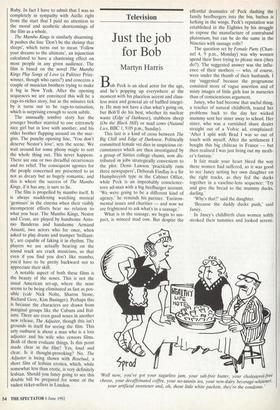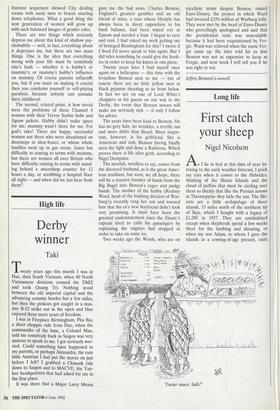Television
Just the job for Bob
Martyn Harris
Bob Peck is an ideal actor for the age, and he's popping up everywhere at the moment with his placeless accent and class- less mien and general air of baffled integri- ty. He may not have a clue what's going on, but Bob'll do his best, whether its nuclear waste (Edge of Darkness), stubborn sheep (On the Black Hill) or mad cows (Natural Lies, BBC 1, 9.05 p.m., Sunday).
This last is a kind of cross between The Big Chill and Edge of Darkness. Politically committed female vet dies in suspicious cir- cumstances which are then investigated by a group of Sixties college chums, now dis- tributed in jobs strategically convenient to the plot. Denis Lawson 'practically runs three newspapers', Deborah Findlay is a Sir Humphreyish type in the Cabinet Office, while Peck is an improbably conscience- torn ad-man with a big beefburger account. 'We were going to be a different kind of agency,' he reminds his partner. 'Environ- mental issues and charities — and now we are frightened to ask what's in a sausage.'
What is in the sausage, we begin to sus- pect, is minced mad cow. But despite the
effortful dramatics of Peck dashing the family beefburgers into the bin, bathos is lurking in the wings. Peck's reputation was established in the Eighties by his struggle to expose the manufacture of contraband plutonium, but can he do the same in the Nineties with sausage rolls?
The question set by Female Parts (Chan- nel 4, 9 p.m., Monday) was why women spend their lives trying to please men (they do?). The suggested answer was the influ- ence of their mothers — who, of course, were under the thumb of their husbands. I say 'suggested' because the programme consisted more of vague assertion and of misty images of little girls lost in nurseries than of conscientious argument.
Janey, who had become that useful thing, a teacher of natural childbirth, traced her problems back to the day her wicked mummy sent her sister away to school. Her sister, who was a varnished share dealer straight out of a Volvic ad, complained: 'After I split with Brad I was so out of touch with myself. After the settlement I bought this big château in France — but then realised I was just living out my moth- er's fantasy.'
It fair made your heart bleed the way these women had suffered, so it was good to see Janey setting her own daughter on the right tracks, as they fed the ducks together in a vaseline-lens sequence: 'Try and give the bread to the mummy ducks, darling.'
'Why's that?' said the daughter.
'Because the daddy ducks push,' said Janey.
In Janey's childbirth class women softly stroked their tummies and looked serene.
'Well now, you've got your sugarless jam, your salt-free butter, your cholesterol free cheese, your decaffeinated coffee, your no-tannin tea, your non-dairy beverage-whitener, your artificial sweetener and, oh, those little white packets, they're the condoms.'
Intercut sequences showed City dealing rooms with nasty men in braces snarling down telephones. What a good thing the next generation of women will grow up with such balanced images of gender roles.
There are two things which seriously depress me about this kind of shallow psy- chobabble — well, in fact, everything about it depresses me, but there are two main things. One is the idea that everything wrong with your life must be somebody else's fault — whether it is hubby's or mummy's, or mummy's hubby's influence on mummy. Of course parents influenee you, but if you insist on making it crucial then you condemn yourself to self-pitying paralysis, because nobody can unmake their childhood.
The second, related point, is how trivial were the problems of these Channel 4 women with their Trevor Sorbie bobs and Jigsaw jackets. Hubby didn't make space for me; mummy wasn't there for me. For god's sake! There are happy, successful women out there who were abandoned on doorsteps in shoe-boxes, or whose whole families went up in gas ovens. Janey has difficulty in coming to terms with mummy, but there are women all over Britain who have difficulty coming to terms with stand- ing behind a sweetshop counter for 12 hours a day, or scrubbing a hospital floor all night — and when did we last hear from them?



































































 Previous page
Previous page